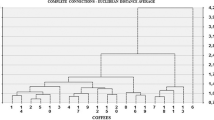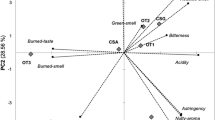Abstract
Sensory evaluation by taste sensitivity measurement differs depending on the evaluator, which means that there is a gap between the coffee that the average consumer finds tasty and the coffee that experts evaluate positively.
In this study, I used data from taste sensor measurements of coffee and a questionnaire survey of ordinary coffee drinkers to identify the characteristics of coffees with a high satisfaction level. The taste sensor uses a sebum film to identify and measure tastes, such as sourness, initial bitterness, initial astringency, umami, and after astringency. In the questionnaire survey, I asked the participants to select words to evaluate their coffee in order to show that even ordinary consumers can clearly evaluate the taste of coffee.
These data were used to develop a LASSO regression model to clarify the differences between high and low satisfaction coffees. The model obtained was sufficiently interpretable, and its discriminant accuracy was also high.
Results indicated that general consumers, prefer the fruity characteristics of coffee, such as aroma and mildness, rather than bitterness.
Access this chapter
Tax calculation will be finalised at checkout
Purchases are for personal use only
Similar content being viewed by others
References
Nakahara, T., Kawahara, H., Hamuro, Y.: Design of experiments to evaluate the taste of coffee. In: The Fall National Conference of Operations Research Society of Japan, Abstracts, pp. 74–75 (2015). (In Japanese)
Tibshirani, R.: Regression shrinkage and selection via the lasso. J. Roy. Stat. Soc. B 58, 267–288 (1996)
Acknowledgements
This work was supported by JSPS KAKENHI Grant Number 19H01542.
Author information
Authors and Affiliations
Corresponding author
Editor information
Editors and Affiliations
Rights and permissions
Copyright information
© 2021 Springer Nature Switzerland AG
About this paper
Cite this paper
Nakahara, T. (2021). Why Do We Love Coffee Even Though It Is Bitter?. In: Meiselwitz, G. (eds) Social Computing and Social Media: Experience Design and Social Network Analysis . HCII 2021. Lecture Notes in Computer Science(), vol 12774. Springer, Cham. https://doi.org/10.1007/978-3-030-77626-8_30
Download citation
DOI: https://doi.org/10.1007/978-3-030-77626-8_30
Published:
Publisher Name: Springer, Cham
Print ISBN: 978-3-030-77625-1
Online ISBN: 978-3-030-77626-8
eBook Packages: Computer ScienceComputer Science (R0)




